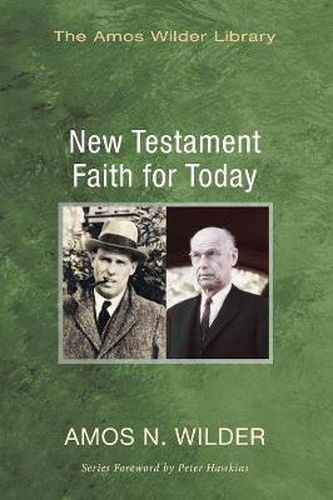Readings Newsletter
Become a Readings Member to make your shopping experience even easier.
Sign in or sign up for free!
You’re not far away from qualifying for FREE standard shipping within Australia
You’ve qualified for FREE standard shipping within Australia
The cart is loading…






This title is printed to order. This book may have been self-published. If so, we cannot guarantee the quality of the content. In the main most books will have gone through the editing process however some may not. We therefore suggest that you be aware of this before ordering this book. If in doubt check either the author or publisher’s details as we are unable to accept any returns unless they are faulty. Please contact us if you have any questions.
What was the faith behind the proclamations of Jesus, the message of Paul, and the Johannine witness–and how can it be recovered today? This penetrating and provocative book seeks to probe the various formulations of religious faith in the New Testament with a view to recovering the real essence and genius of Christianity today. Dr. Wilder sees three principal strains–often harmonious but sometimes disparate–in New Testament faith: the proclamations of Jesus, the message of Paul, and the witness of John the Evangelist. First, he studies what has happened to our faith since its original message emerged from the concrete historical act and the resultant community of experience. In the time since, flesh and spirit, as well as humanity and divinity, have come to be regarded as mutually exclusive, making it necessary for scientific humanism to develop a language of its own–for religion has lost communication with it. Jesus’ message, however, was a total claim and a total hope, a prophetic forecast of human destiny. Paul, though he spoke a different language and used different symbols, laid the groundwork for an epochal revolution of the race. John, for his part, emphasized eternal life here and now and previsioned a Christian freedom. Dr. Wilder ends with a stirring plea for a postliberal viewpoint that will recover the insights of the past without its mythology and terminology.
$9.00 standard shipping within Australia
FREE standard shipping within Australia for orders over $100.00
Express & International shipping calculated at checkout
This title is printed to order. This book may have been self-published. If so, we cannot guarantee the quality of the content. In the main most books will have gone through the editing process however some may not. We therefore suggest that you be aware of this before ordering this book. If in doubt check either the author or publisher’s details as we are unable to accept any returns unless they are faulty. Please contact us if you have any questions.
What was the faith behind the proclamations of Jesus, the message of Paul, and the Johannine witness–and how can it be recovered today? This penetrating and provocative book seeks to probe the various formulations of religious faith in the New Testament with a view to recovering the real essence and genius of Christianity today. Dr. Wilder sees three principal strains–often harmonious but sometimes disparate–in New Testament faith: the proclamations of Jesus, the message of Paul, and the witness of John the Evangelist. First, he studies what has happened to our faith since its original message emerged from the concrete historical act and the resultant community of experience. In the time since, flesh and spirit, as well as humanity and divinity, have come to be regarded as mutually exclusive, making it necessary for scientific humanism to develop a language of its own–for religion has lost communication with it. Jesus’ message, however, was a total claim and a total hope, a prophetic forecast of human destiny. Paul, though he spoke a different language and used different symbols, laid the groundwork for an epochal revolution of the race. John, for his part, emphasized eternal life here and now and previsioned a Christian freedom. Dr. Wilder ends with a stirring plea for a postliberal viewpoint that will recover the insights of the past without its mythology and terminology.